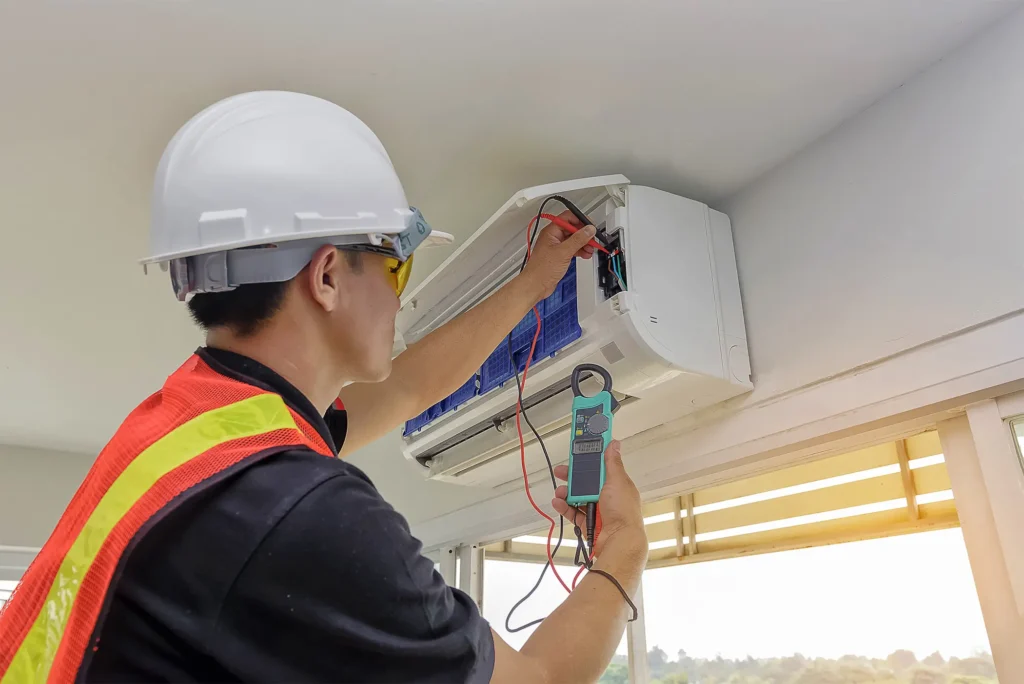Exploring the Various Types of AC RepairsThe Architecture Designs

Air conditioning systems are pivotal in ensuring comfort in homes and workplaces, especially during the scorching heat of summer months. However, like any other mechanical system, AC units are prone to a range of issues that can impair their efficiency or cause them to fail entirely. Understanding the different types of AC repairs can help homeowners and facility managers anticipate the kind of maintenance their systems might require.
Common AC Problems and Repairs
Air conditioners consist of several components, each susceptible to specific issues. Knowing what can go wrong helps in diagnosing problems and communicating more effectively with repair technicians.
Refrigerant Leaks
One of the most common air conditioning problems is the refrigerant leak. Refrigerant, the substance responsible for cooling the air within the AC system, can leak due to corrosion or damage to the refrigerant lines. Repairing a refrigerant leak involves locating and sealing the leak, followed by charging the system with the correct amount of refrigerant. This task requires precision and understanding of the specific system’s requirements, as the amount and type of refrigerant must perfectly match the manufacturer’s specifications.
Faulty Wiring and Electrical Issues
Improper, haphazard, or aged wiring can lead to a multitude of AC problems, including preventing the system from receiving power or tripping the circuit breaker. Electrical repairs in an AC system might involve replacing old wires, tightening connections, or upgrading circuit breakers that handle the unit’s electrical load. These repairs ensure the system operates safely without risking electrical fires or damage to the components.
Fan Problems
An air conditioner has two main fans: the evaporator fan, which blows air over the cold evaporator coil to cool the air inside the building, and the condenser fan, which expels heat outside the building. Fan issues might include motor failures, worn belts, and loose or bent blades. Repairs might involve replacing worn out motor bearings, aligning or replacing belts, or correcting blades to prevent the system from overheating.
Clogged Drain Lines
source: applianceguard
The process of cooling air also removes moisture, which usually drains out of the system. If the drain line gets clogged, water can back up and damage the AC unit, or cause water leaks that damage the building itself. Repairing this issue involves clearing the clog and ensuring the line is free of obstructions. It’s also a good practice to clean these lines periodically to prevent mold and algae buildup.
Thermostat Issues
Sometimes the problem with an air conditioning system isn’t with the unit itself but with the thermostat. A malfunctioning thermostat can lead to issues with the comfort levels in a home or building. Repairs might involve recalibrating the thermostat, replacing batteries, or replacing the thermostat unit entirely. For modern systems, upgrading to a smart thermostat can provide better control and efficiency.
Compressor Issues
source: airconditioning-tamarac
The compressor, which is responsible for moving the refrigerant between the evaporator and condenser coils, is often considered the heart of the air conditioning system. Problems with the compressor can be costly. Signs of compressor failure include strange noises, difficulty starting, or the unit not cooling. Repairing a compressor often involves replacing it entirely, which can be one of the more costly repairs due to the part’s expense and the labor involved.
Condenser Coil Cleaning
While not necessarily a repair, maintaining the condenser coil is crucial for the health and efficiency of the AC system. The condenser coil can become dirty over time, especially in environments with high dust or pollution levels. Cleaning the coil involves removing debris, and in some cases, chemical cleaning by a professional to ensure it operates efficiently.
Emergency Repairs vs. Scheduled Maintenance
source: rangerair
Understanding the difference between emergency repairs and scheduled maintenance can save significant time and money. Emergency repairs typically occur when the system fails completely or suffers a significant breakdown. In contrast, scheduled maintenance involves regular checks and minor repairs that prevent larger problems from developing.
Choosing the Right HVAC Professional
When dealing with various AC repairs, the importance of selecting a qualified HVAC technician cannot be overstated. Ensure that the technician is certified, has good reviews, and comes from a reputable company. Experienced professionals can diagnose issues more accurately and perform repairs that last, ensuring the longevity and efficiency of the system.
Conclusion
source: momblogsociety
The types of AC repairs vary widely, from simple filter changes to complex compressor replacements. Homeowners should familiarize themselves with the signs of common AC problems and understand when to call a professional. Regular maintenance and timely repairs can extend the life of an air conditioning system, improve its performance, and reduce the likelihood of costly emergency repairs. Always prioritize safety and efficiency by consulting with experienced HVAC professionals who can provide reliable guidance and service.
The post Exploring the Various Types of AC Repairs appeared first on The Architecture Designs.





